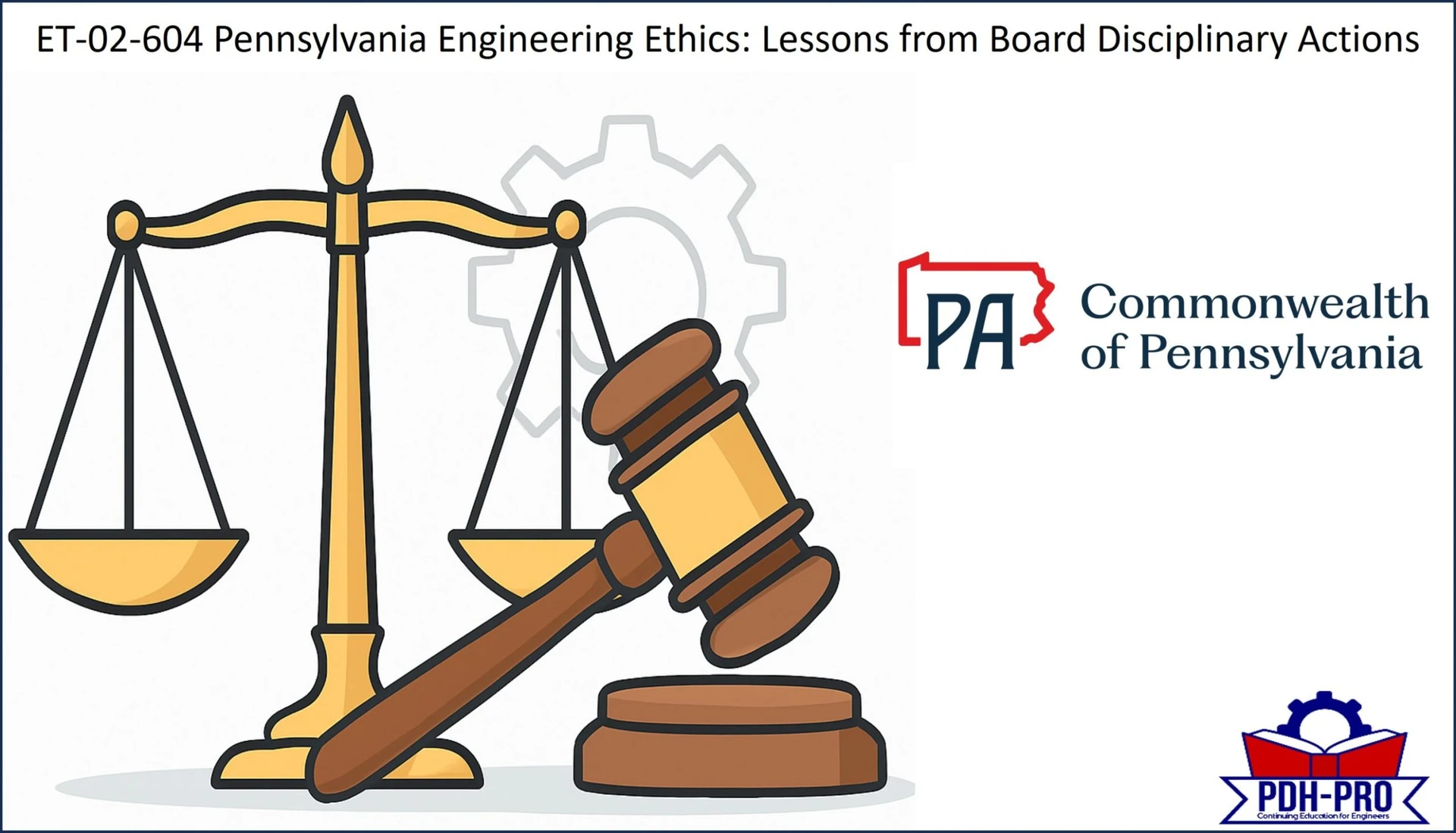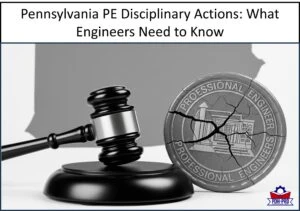Written by: Jordan Ellis, PE
Published: June 18, 2025
As licensed professional engineers, we work under a legal and ethical obligation to protect the public – and that responsibility extends beyond just technical work. It includes staying in compliance with state licensing requirements, continuing education, and professional conduct rules.
In this article, I’m reviewing recent Pennsylvania PE disciplinary actions from 2023 to 2025 issued by the Pennsylvania State Board of Professional Engineers, Land Surveyors, and Geologists. These real-world enforcement cases highlight what can happen when engineers overlook critical requirements – such as license renewal, reporting out-of-state discipline, or staying current with civil penalties.
Whether you’re licensed in Pennsylvania or another state, the trends revealed here offer valuable lessons. Many violations stem from preventable issues, not bad engineering. By understanding what the Board is enforcing, you can avoid costly mistakes and keep your license in good standing.
Related articles:
What are the Most Common Ethics Violations for Professional Engineers
Engineering Ethics in Texas: What We Can Learn from Recent Board Disciplinary Actions
Engineering Ethics in Practice: A 10-Year Review of Disciplinary Actions in New York (2016–2025)
Florida PE Disciplinary Cases: Lessons from Recent Board Actions
Ethics Course for Pennsylvania Engineers

This one-hour online course enables Pennsylvania Professional Engineers to earn guaranteed PDH credit while deepening their understanding of ethical obligations and state board requirements. Through real disciplinary case studies, participants will learn to identify common violations, navigate the Board’s disciplinary process, and apply practical strategies to maintain compliance and protect their license. Ideal for engineers dedicated to upholding professional integrity and safeguarding public trust in Pennsylvania.
Overview of Disciplinary Trends
Between 2023 and 2025, the Pennsylvania State Board of Professional Engineers, Land Surveyors, and Geologists issued a range of disciplinary actions against licensed Professional Engineers (PEs). After reviewing publicly available board decisions, I found a total of 13 cases involving PEs with each tied to a specific violation of the state’s licensure laws or ethics rules.
The most common issues? Administrative lapses and reporting failures. Engineers were frequently disciplined for not reporting disciplinary actions taken in other states, practicing on an expired license, or failing to pay prior civil penalties. A few more serious cases involved criminal convictions and allegations of gross professional misconduct.
Here’s a quick summary of the types of violations:
- 4 cases involved discipline from other states that wasn’t properly reported to the Pennsylvania board.
- 3 cases involved engineers practicing without a current license.
- 3 cases were tied to criminal convictions, resulting in revocation or probation.
- 2 cases stemmed from failure to pay a previously imposed fine.
- 1 case involved allegations of gross negligence or incompetence.
The penalties varied, but they included:
- Fines ranging from $1,000 to $2,500
- License suspensions, revocations, or probation
- Reprimands and investigation cost recovery
For many engineers, these cases serve as a reminder: compliance isn’t just about ethics. It’s about paperwork, deadlines, and disclosure.
Pennsylvania PE Disciplinary Actions Summary (2023-2025)
| Case | Type | Violation Summary | Action Taken | Date |
| Case 1 | PE | Out-of-state license revoked | PA license revoked | 02/04/25 |
| Case 2 | PE | Felony conviction, failure to notify Board | 2-year suspension, stayed for probation | 03/24/25 |
| Case 3 | PE | Criminal conviction | Voluntary license surrender | 03/27/25 |
| Case 4 | PE | Practiced without an active license | $2,100 fine | 01/24/24 |
| Case 5 | PE | Out-of-state discipline | $2,500 fine, reprimand | 01/24/24 |
| Case 6 | PE | Practiced on expired license | $1,850 fine | 03/13/24 |
| Case 7 | PE | Failure to pay prior penalty | License suspended | 09/27/24 |
| Case 8 | PE | Failure to pay prior penalty | License suspended | 09/27/24 |
| Case 9 | PE | Out-of-state discipline and failure to report | 5-year probation | 06/07/24 |
| Case 10 | PE | Out-of-state probation/suspension | $1,000 fine, PA license on probation until FL license clears | 07/24/24 |
| Case 11 | PE | Felony conviction | License revoked | 05/13/24 |
| Case 12 | PE | Gross negligence/incompetence | $1,000 fine, reprimand, $268.19 investigation costs | 05/29/24 |
| Case 13 | PE | Practiced without a license | $1,600 fine | 09/28/23 |
Most Common Violations Against PEs
To help make sense of the Pennsylvania PE disciplinary actions from 2023 to 2025, I’ve grouped the violations into key categories. These aren’t rare or obscure issues – they’re mistakes that any busy engineer could make. That’s what makes them worth reviewing.
1. Out-of-State Discipline and Failure to Report
One of the most common violations involved engineers who had their licenses disciplined in another state – such as Illinois, Florida, or South Carolina – but failed to report it to the Pennsylvania board within the required timeframe.
Pennsylvania requires licensees to disclose any disciplinary action taken by another jurisdiction either:
- Within 90 days of the final order, or
- On their next biennial renewal, whichever comes first.
Failing to report can result in license suspension, probation, or even revocation, regardless of the underlying offense in the other state.
Takeaway: If you hold licenses in multiple states, it’s your responsibility to report any action against you – no matter how minor it may seem.
2. Practicing Without a License
In several cases, engineers continued practicing despite an expired or lapsed license. Some mistakenly believed they were still in good standing. Others were cited for submitting sealed documents during a period when their license wasn’t active.
These cases typically resulted in civil penalties ranging from $1,600 to $2,100.
Takeaway: Always verify your license status before sealing or submitting work. If you miss a renewal, stop practicing until it’s corrected.
3. Criminal Convictions
Pennsylvania law requires PEs to report criminal convictions, especially felonies, within 30 days of a verdict or plea. In the cases reviewed, engineers who failed to report convictions – or were deemed a public risk based on their offense had their licenses revoked or placed on strict probation.
Takeaway: Criminal charges, even unrelated to engineering, can impact your license. If in doubt, report it.
4. Failure to Pay Prior Penalties
Two engineers had their licenses suspended for failing to pay previously imposed civil penalties. This is considered non-compliance with a final board order and triggers enforcement automatically.
Takeaway: Once a fine is issued, failure to pay can be just as serious as the original violation.
5. Gross Negligence or Incompetence
In one case, the board found that an engineer had engaged in gross negligence or professional misconduct. This resulted in a reprimand, a fine, and reimbursement of investigation costs.
Takeaway: Beyond technical mistakes, poor judgment or carelessness can bring serious disciplinary consequences.
Summary Table of Violations and Penalties
To make the trends even clearer, here’s a breakdown of the violations and their outcomes based on the 13 confirmed Pennsylvania PE disciplinary cases from 2023 to 2025:
| Violation Type | Number of Cases | Penalty Summary | Fine Range |
| Out-of-State Discipline / Failure to Report | 4 | License revoked, probation, reprimand | $1,000 – $2,500 |
| Unlicensed Practice (Expired/Lapsed) | 3 | Civil fines | $1,600 – $2,100 |
| Criminal Convictions | 3 | License revocation or probation | None (no fines) |
| Failure to Pay Prior Penalty | 2 | License suspended | None (prior fine unpaid) |
| Gross Negligence / Incompetence | 1 | Reprimand, fine, and investigation cost | $1,000 + $268.19 |
Most of these violations are preventable—and many began with a missed deadline, an oversight, or a misunderstanding of multi-state reporting obligations. While some cases stemmed from serious misconduct, the majority resulted from administrative failures that were left unresolved too long.
What Pennsylvania Engineers Can Learn
If there’s one thing these disciplinary actions make clear, it’s that most violations aren’t about technical incompetence. They’re about oversight, timing, and failure to follow through on license obligations.
Here are five key takeaways every Pennsylvania PE should keep in mind:
1. Report Out-of-State Discipline Promptly
If you’re licensed in multiple states and face disciplinary action elsewhere, Pennsylvania requires you to report it either within 90 days of the final order or on your next renewal application—whichever comes first.
Even minor or resolved infractions must be disclosed. Failing to do so is a separate violation that can lead to suspension or revocation.
2. Do Not Practice on a Lapsed or Expired License
Continuing to seal or submit work while your license is inactive – even if unintentionally – qualifies as unlicensed practice. This was one of the most frequent and costly mistakes engineers made.
Before starting a project or submitting plans, confirm that your license is in active status with the Board.
3. Pay Fines and Resolve Board Orders Promptly
Two engineers were disciplined simply for failing to pay prior penalties. Once the Board issues a fine or order, compliance is not optional. Unpaid fines can trigger license suspension – even if the original violation was minor.
4. Disclose Criminal Convictions
If you are convicted of a felony or any offense that may reflect on your fitness to practice, Pennsylvania law requires you to notify the Board within 30 days.
Even if the offense is unrelated to engineering, failure to disclose can lead to revocation, especially if the Board believes you pose a risk to the public.
5. Stay Proactive About Professional Conduct
One engineer was disciplined for gross negligence – an uncommon but serious charge. While most of us don’t face these accusations, it’s a reminder that ethical and professional conduct are just as important as technical expertise.
Bottom line:
It’s easier to maintain your license than to fix it after a violation. These real cases show that staying compliant doesn’t require perfection – just consistency, communication, and attention to your obligations as a PE.
Definition of Misconduct in PA
A professional engineer, professional land surveyor or professional geologist who is found guilty by the Board of gross negligence, incompetency or misconduct in the practice of engineering, land surveying or geology or of a violation of the Code of Ethics of the profession of engineering or land surveying is subject to disciplinary action under section 4(g) of the act (63 P. S. § 151(g)). Misconduct in the practice of engineering, land surveying or geology includes the following:
(1) Being convicted of a criminal offense such as extortion, bribery or fraud or entry of a plea of nolo contendere to a charge thereof for conduct relating to the practice of engineering, land surveying or geology.
(2) Being unable to practice engineering, land surveying or geology with reasonable skill and safety by reason of drunkenness, use of controlled substances, chemicals or other types of inhibiting materials, or as a result of a mental or physical incapacity which prevents the practice of engineering, land surveying or geology.
(3) Failing to exercise supervision over a person who is authorized by the employer to practice engineering, land surveying or geology only under the supervision of a professional engineer, professional land surveyor or professional geologist.
(4) Delegating responsible charge to an individual who the professional engineer, professional land surveyor or professional geologist knows or has reason to know is not qualified by training or experience to personally and independently engage in and be entrusted with the work involved in the practice of engineering, land surveying or geology.
(5) Being convicted of a felony in a state or Federal court or being convicted of a misdemeanor in the practice of engineering, land surveying or geology. As used in this paragraph, the term “convicted” includes a finding or verdict of guilt, an admission of guilt or a plea of nolo contendere.
(6) Making misleading, deceptive, untrue or fraudulent representations in the practice of engineering, land surveying or geology.
(7) Practicing fraud or deceit in obtaining a license to practice engineering, land surveying or geology.
(8) Submitting a false or deceptive biennial registration to the Board.
(9) Reviewing on behalf of a public entity or an agency of government plans on which the individual performing the review, or a member or employe of the individual’s firm, has participated in any manner, including an advisory capacity. A violation of the act of October 4, 1978 (P. L 883, No. 170) (65 P. S. §§ 401-413), known as the Public Official and Employee Ethics Law, as the violation relates to the practice of engineering, land surveying or geology, is a violation of this section and chapter.
Closing Thoughts and Resources
Reading through these Pennsylvania PE disciplinary actions, one pattern stands out: most of these engineers didn’t lose their licenses because of bad engineering—they lost them because they overlooked something preventable.
Late renewals. Missed disclosures. Unpaid fines.
These aren’t moral failings – they’re administrative missteps that snowball into serious consequences if left unresolved.
As a professional engineer, I know how easy it is to get caught up in project deadlines, client needs, and technical work. But your license is what makes all of that possible. Staying compliant with the Pennsylvania State Board requirements is just as important as your next design submittal or bid package.
If you’re unsure whether you’re meeting your continuing education requirements, need an ethics refresher, or just want to ensure you’re following best practices, make it a priority. It’s far easier – and far less expensive – than facing discipline after the fact.
Helpful Resources for Pennsylvania PEs:
- Pennsylvania PDH Requirements for Professional Engineers
- Engineering Ethics and Professional Conduct Course
- Complete PDH Packages for Pennsylvania License Renewal
Pennsylvania BPOA Disciplinary Action References
- https://www.pa.gov/content/dam/copapwp-pagov/en/dos/alerts-and-notices/bpoa-disciplinary-actions/2025/2025-april.pdf
- https://www.pa.gov/content/dam/copapwp-pagov/en/dos/alerts-and-notices/bpoa-disciplinary-actions/2025/2025-february.pdf
- https://www.pa.gov/content/dam/copapwp-pagov/en/dos/alerts-and-notices/bpoa-disciplinary-actions/2025/2025-march.pdf
- https://www.pa.gov/content/dam/copapwp-pagov/en/dos/alerts-and-notices/bpoa-disciplinary-actions/2025/2025-january.pdf
- https://www.pa.gov/content/dam/copapwp-pagov/en/dos/alerts-and-notices/bpoa-disciplinary-actions/2024/2024-January.pdf
- https://www.pa.gov/content/dam/copapwp-pagov/en/dos/alerts-and-notices/bpoa-disciplinary-actions/2024/2024-september.pdf
- https://www.pa.gov/content/dam/copapwp-pagov/en/dos/alerts-and-notices/bpoa-disciplinary-actions/2024/2024-august.pdf
- https://www.pa.gov/content/dam/copapwp-pagov/en/dos/alerts-and-notices/bpoa-disciplinary-actions/2024/2024-April.pdf
- https://www.pa.gov/content/dam/copapwp-pagov/en/dos/alerts-and-notices/bpoa-disciplinary-actions/2024/2024-February.pdf
- https://www.pa.gov/content/dam/copapwp-pagov/en/dos/alerts-and-notices/bpoa-disciplinary-actions/2024/2024-March.pdf
- https://www.pa.gov/content/dam/copapwp-pagov/en/dos/alerts-and-notices/bpoa-disciplinary-actions/2024/2024-June.pdf
- https://www.pa.gov/content/dam/copapwp-pagov/en/dos/alerts-and-notices/bpoa-disciplinary-actions/2024/2024-october.pdf
- https://www.pa.gov/content/dam/copapwp-pagov/en/dos/alerts-and-notices/bpoa-disciplinary-actions/2024/2024-july.pdf
- https://www.pa.gov/content/dam/copapwp-pagov/en/dos/alerts-and-notices/bpoa-disciplinary-actions/2024/2024-november.pdf
- https://www.pa.gov/content/dam/copapwp-pagov/en/dos/alerts-and-notices/bpoa-disciplinary-actions/2024/2024-May.pdf
- https://www.pa.gov/content/dam/copapwp-pagov/en/dos/alerts-and-notices/bpoa-disciplinary-actions/2024/2024-december.pdf

